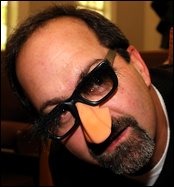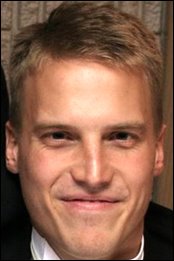The Stacked Committee
Earlier this week Douglas Wilson and his toadies repeated their contention against the PCA that it stacked the ad interim committee that was appointed to study the Federal Vision. In fact, the Fearless Leader went so far as to declare the PCA a kangaroo court because of this so-called “stacked committee.” Ironically, he made this declaration ex cathedra, without so much as a trial that granted the presumption of innocence to the accused, which happened to be the entire PCA. Even more ironic, Wilson refused to contact — in person — every commissioner who served on the committee to confirm that they were in fact stacked against the FV. Presumably he relied solely upon his assessment of their written statements.
Anyway, this got me to thinking about the committee of CREC confederates whom Sister Randy Booth appointed to examine Douglas Wilson’s orthodoxy. To paraphrase the questions of a commenter, Who exactly examined the Fearless Leader? Was it an unbiased committee? Were there members of the committee who were on record as being opposed to the FV? Why isn’t there a minority report? These are all great questions and Wilson and the CREC should be quick to answer them. But to my knowledge no one has ever asked them. So in a spirit of good faith and with a sincere desire to help establish the facts surrounding this historic examination, I shall answer these questions to the best of my ability on my fully documented anonymous attack blog.
Now, before answering the question “Who examined Douglas Wilson?” you have to remember that it didn’t matter who was on the committee because no one in the CREC has the ability to touch Douglas Wilson unless two members of Christ Church bring charges against the entire Kult session and successfully prosecute all of them in front of the CREC confederates, who happen to be the same confederates who ran Church of the King–Santa Cruz out of their federation after Wilson put his crosshairs on Andrew Sandlin. So this examination was really a meaningless exercise. Wilson could have revealed that he believes the Book of Nehemiah authorizes him to dissolve thirty-year old marriages (which he really does believe: “Remember him, O God, concerning this, and wipe not out his evil deeds that he has done to the household of God, and the institutions thereof.”) and the confederates would have been utterly impotent to remove him from the ministry, which doesn’t matter because their track record demonstrates they wouldn’t have cared anyway.
Therefore, since the exam had no ecclesiastic value, it was all for show. In fact, it was the ultimate doug and pony show because of all the mileage he got out of it. But can you imagine how humiliating it must have been for those men to pretend as though they had legitimate authority to hold Wilson accountable when they knew all along they were nothing but a bunch of monkey boys pandering to his monstrous ego? How embarrassing. Nevertheless, this brings us to that all-important question, Who examined Douglas Wilson? Obviously they were all CREC confederates; so taking them alphabetically we find: Jeffrey Niell
Jeffrey Niell
Jeffrey Niell, pastor of Emmanuel Covenant Church, Glendale, AZ, has an M.A. from Fuller Theological Seminary. Neither the CRE minutes nor his church’s website reveal anything about his background — how he entered the pastorate, who ordained him, how his church landed in the CREC, etc. But he is the first man on the committee to examine Wilson’s orthodoxy.
Burke Shade Burke Shade, pastor of Cornerstone Reformed Church, Carbondale, IL, was lawfully defrocked from the ministry by the PCA in 1999. But the interesting thing about Shade’s story is the way Wilson brought him into the CRE. According to the Christ Church Elders’ Meeting Minutes, Wilson promised Shade membership in the CRE while he was on trial in the PCA for teaching false doctrine. Consequently, the Christ Church elders appointed an ad hoc committee to investigate Burke Shade’s defrocking in order “to get to an ordained conclusion.” The hypocrisy surrounding the Kult’s so-called “vindication” of Burke Shade is simply staggering; you can read more about it here and here. These guys really know how to put on a show.
Burke Shade, pastor of Cornerstone Reformed Church, Carbondale, IL, was lawfully defrocked from the ministry by the PCA in 1999. But the interesting thing about Shade’s story is the way Wilson brought him into the CRE. According to the Christ Church Elders’ Meeting Minutes, Wilson promised Shade membership in the CRE while he was on trial in the PCA for teaching false doctrine. Consequently, the Christ Church elders appointed an ad hoc committee to investigate Burke Shade’s defrocking in order “to get to an ordained conclusion.” The hypocrisy surrounding the Kult’s so-called “vindication” of Burke Shade is simply staggering; you can read more about it here and here. These guys really know how to put on a show.
Gregg Strawbridge Gregg Strawbridge, Pastor of All Saints’ Presbyterian, Lancaster, PA, has a Ph.D. from University of Southern Mississippi (Education & Philosophy) and has a strong resume on paper. However you won’t find the following little fact on his background check unless you contact his former church, because that’s when you’ll learn that while Strawbridge was an ordained officer in a Baptist church, he was teaching paedobaptism behind the backs of his fellow officers contrary to his covenantal vow to his church’s constitution, but pursuant to Wilson’s instruction. He did this for over a year and gathered a small following. When his fellow officers caught him, they terminated his employment on the spot. Think of it as a failed coup for the kingdom of Doug.
Gregg Strawbridge, Pastor of All Saints’ Presbyterian, Lancaster, PA, has a Ph.D. from University of Southern Mississippi (Education & Philosophy) and has a strong resume on paper. However you won’t find the following little fact on his background check unless you contact his former church, because that’s when you’ll learn that while Strawbridge was an ordained officer in a Baptist church, he was teaching paedobaptism behind the backs of his fellow officers contrary to his covenantal vow to his church’s constitution, but pursuant to Wilson’s instruction. He did this for over a year and gathered a small following. When his fellow officers caught him, they terminated his employment on the spot. Think of it as a failed coup for the kingdom of Doug.
Dennis Tuuri Dennis Tuuri, Pastor of Reformation Covenant Church, Oregon City, OR, has perhaps the most confusing background of all the men examining Wilson. His church’s website states, “Ordained in 1983 as RCC’s first Elder, Dennis’ faithfulness to God’s Word has been a blessing within and without the church.” This statement appears clear — someone ordained Tuuri an elder in 1983 — but that’s all it says. It doesn’t tell us how and when he made it to the pastorate, just as it doesn’t reveal who ordained him or even if he was ordained. The CRE minutes add to this confusion; read it and try to make sense of it:
Dennis Tuuri, Pastor of Reformation Covenant Church, Oregon City, OR, has perhaps the most confusing background of all the men examining Wilson. His church’s website states, “Ordained in 1983 as RCC’s first Elder, Dennis’ faithfulness to God’s Word has been a blessing within and without the church.” This statement appears clear — someone ordained Tuuri an elder in 1983 — but that’s all it says. It doesn’t tell us how and when he made it to the pastorate, just as it doesn’t reveal who ordained him or even if he was ordained. The CRE minutes add to this confusion; read it and try to make sense of it:
Motion (DW/BB) to extend the fraternal status of Reformation Covenant Church of Canby, Oregon. Doug described that a concern about RCC had been raised by Westminster Presbyterian Church of at last year’s CRE Presbytery meeting. The concern centered around the ordination of RCC’s pastor, Dennis Tuuri. Doug mentioned many recommendations from pastors of other churches testifying to Dennis Tuuri’s godly character. He believes that reconciliation between RCC and WPC is unlikely apart from RCC becoming part of a larger body like the CRE. Doug made it clear that this motion to extend RCC’s fraternal status should not be misconstrued to reflect negatively on CC. The CRE is not finding fault, but simply needs more time to decide how to proceed. We wish to treat RCC as a church body unto themselves, independently from WPC. Richard Mahar, an elder at RCC, read a statement (see attachment A) which could be summarized as follows: RCC has sought reconciliation in the past with WPC, but WPC has refused further discussions until RCC has become accountable to another ecclesiastical authority. Yet WPC has, in effect, told the CRE not to allow RCC to become accountable to them. This puts RCC in a dilemma. Also, WPC has charged Dennis Tuuri with “abuse of the flock” because of certain actions which he took as a minister, actions which would be correct if WPC would recognize his ordination, which they do not. RCC believes the characterization of Dennis Tuuri is inaccurate, and welcomes the opportunity to be subject to a court outside RCC and WPC. They are concerned that, if the CRE postpones their entrance, the stigma of being denied entrance to the CRE will be added to the accusation that they are not accountable, giving their detractors additional opportunity to continue the accusations. He concluded with an appeal to the CRE to vote in favor of their entrance.
Doug defended Dennis Tuuri’s ordination as being valid, albeit irregular. The delay of one year has nothing to do with Dennis’s ordination. The CRE is not by its actions giving any credence to the ordination charge or any credibility to any other charge against RCC. Doug recognized that there are no formal, judicial charges against RCC. He noted that no such charge could be brought to the CRE unless it was made against the entire session. After a request for further input, the motion passed 6-0. (Confederation of Reformed Evangelicals, Second Annual Presbytery Meeting Minutes, 3–4)
When you consider that the CRE had to put the best possible spin on this narrative, it sure looks as though Tuuri led a small faction out of another church. Whatever he did, this much is true about Dennis Tuuri: the PCA charged him with “abuse of the flock” and his ordination, whoever performed it, was “irregular”: “WPC [PCA] has charged Dennis Tuuri with ‘abuse of the flock’ because of certain actions which he took as a minister, actions which would be correct if WPC would recognize his ordination, which they do not. . . . Doug defended Dennis Tuuri’s ordination as being valid, albeit irregular. The delay of one year has nothing to do with Dennis’s ordination.”
 Garry Vanderveen
Garry VanderveenGarry Vanderveen, Pastor of Christ Covenant Church, Langley, BC, Canada, graduated from Greenville Seminary. Neither the CRE minutes nor his church website reveal anything about Vanderveen’s background — how he entered the pastorate, who ordained him, how his church landed in the CREC, etc.
Accordingly, the committee that examined Douglas Wilson’s orthodoxy was composed of five men and any way you cut it, this was as fair and balanced a committee that Wilson could ever request. Two of them — Jeffrey Niell & Garry Vanderveen — have invisible credentials and consequently we know nothing about them. Gregg Strawbridge is as educated as he is unscrupulous. Dennis Tuuri, whose ordination is “irregular,” received political asylum in the CREC after his former church accused him of “abusing the flock.” And Burke Shade is a defrockee. A minister couldn’t ask for a better combination of men to represent the corrupt federation that he founded.
You can read their report here and since they voted unanimously to affirm Wilson’s orthodoxy, there is no minority report.
Thank you.
































5 comments:
Mark:
Garry Vanderveen was ordained as a minister in the Orthodox Christian Reformed Church (my former denomination).
He served another congregation in Canada for a short time before being called to his current pastorate in Langley.
I do not know, however, how the church became part of the CREC.
Daniel,
Thanks for info: do you know what kind of educational training he has and do you know who ordained him?
He graduated from Greenville as you mentioned. I do not recall where he took his undergraduate.
He was ordained & installed in the OCRC by the men of the Eastern Classis. Their polity would require an examination by the Classis with Synodical delegates present to ratify the call, so it was, in essence, a federational decision.
So I should say, in his defense, that he has had proper training and proper credentials (at least up to the time he left the OCRC. I say this because I am unaware of the transfer process to the CREC).
Full membership in the CREC is a two-year process. Vanderveen started in 1999, which is the two-year mark for the federation, and became a full member in 2001. That’s all the minutes say about him.
http://www.reformedcatholicism.com/?p=1601
Post a Comment